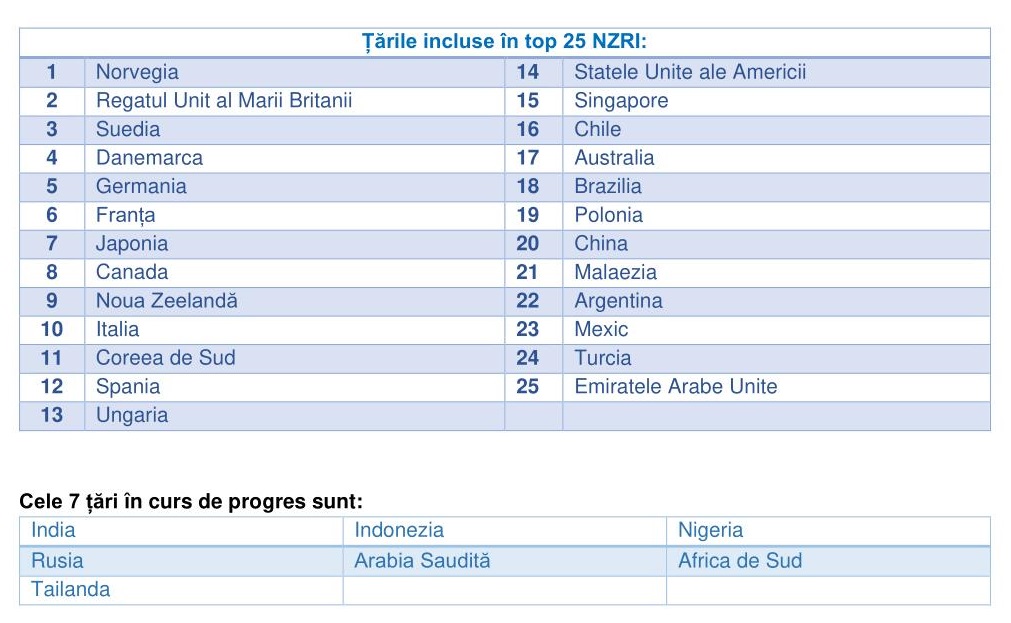The oil-rich Nordic nation of Norway has been ranked number one in KPMG’s first-ever Net Zero Readiness Index (NZRI). The report compares the progress of a selection of countries in reducing the greenhouse gas emissions that cause climate change and assesses their preparedness and ability to achieve Net Zero by 2050. Using 103 indicators, recognized as key drivers to achieving Net Zero, the top 25 performing countries and seven ‘countries to watch’ were identified.
Despite being one of the world’s largest oil and gas exporters, Norway topped this year’s NZRI, partly due to private and public investment in renewable energy and electrified transport across the country. In 2016, the Norwegian parliament voted to bring forward its target date for carbon neutrality from 2050 to 2030. However, despite its top ranking, the nation still faces significant decisions over how it continues to tackle challenges in its transition to net zero.
The UK, which is preparing to host the COP26 Climate Summit next month, took overall second place, due in-part to cross-party political support and clear legally-backed targets that have enabled the comparatively swift decarbonization of the country’s power generation sector, but many obstacles remain – particularly on heat and buildings.
Norway’s Nordic neighbor, Sweden, ranked third for being ‘highly ambitious’ and an international advocate for climate policy, green energy and technology. The country’s next step to Net Zero is to reduce its continued reliance on agricultural exports and imports.
Key findings from the Index include:
• Some countries are lagging in adopting Net Zero with only 9 of those surveyed, accounting for approximately 8 percent of global emissions, having legally binding commitments in place. In order to stimulate delivery capability at the sector level, these targets need to be backed by robust strategies, policies and support mechanisms. In most jurisdictions the NZRI preparedness on a national level is mirrored by the level of readiness at the sector level.
• A lack of delivery capability is a weak point in global Net Zero ambitions. The Index shows that those countries with a Net Zero target in place, either legally binding or policy, demonstrate stronger capability across sectors. The report also shows a correlation between prosperity and the readiness to achieve Net Zero, highlighting the need to escalate the mobilization of support to developing economies.
• Insights from all surveyed nations show that whilst the global financial sector is increasingly factoring climate risk into its investment and lending decisions, governments have a critical role to play in enhancing access to such financing by creating enabling environments such as sustainable finance strategies, policies and regulatory frameworks.
• These country insights also help to highlight the importance of political alignment and public support in the success of key decarbonization initiatives.

The publication of the Net Zero Readiness Index comes ahead of November’s crucial COP26 Climate Summit in Glasgow. The United Nations has outlined that greenhouses gases in the atmosphere are at their highest level for three million years, driving a global temperature increase of 0.85 degrees Celsius between 1880 and 2012 and a rise in sea-levels of 19cm. Political and business leaders are becoming increasingly aware that immediate action is required to stop the catastrophic social, environmental and economic impacts further temperature rises could have on the planet.
Richard Threlfall, Global Head of KPMG IMPACT, said:
“Climate change is the existential challenge facing humanity, but we need to face what seems like an overwhelming challenge with positivity and a sense of collective responsibility. It is vital that every individual, organization and country collaborates to an unprecedented degree, and with transparency and honesty. I hope that the NZRI will encourage countries that have a long way to go to learn from those who are making the most progress, and encourage everyone who reads it to play their part in getting us to Net Zero.”
Mike Hayes, Global Head of Climate Change & Decarbonization at KPMG, commented:
“Over the past 18 months, we have witnessed a phenomenal and welcome rise in net zero and science-based targets commitments from the public and private sector and national Governments. As a result, we’re starting to see businesses take a more proactive approach to addressing their decarbonization objectives. The fundamental challenge for business, however, is how to move from making commitments to delivering them and stakeholders will want to see progress before too long. It is clear that the business community and political leaders are responding to the crisis, but there is clearly much more that could and should be done. KPMG’s Net Zero Readiness Index highlights the patchwork effect that we’re now starting to see globally. From territory to territory, different priorities are having different effects. With COP26 a matter of weeks away, this is our moment to learn from each other and ensure world and business leaders take a collaborative, action-focused approach to the climate challenge and help make net zero a reality before it is too late.”
 Ramona Jurubiță, Country Managing Partner, KPMG in Romania, explains: “Since the launch of the Impact Plan, KPMG in Romania has outlined the path which we believe the country should take to improve its progress towards reaching Net Zero, starting with the development of business leadership models which focus on reaching this target, as the expression of a new mindset in the business environment. Romania has never had a “green” culture, even less a “green” education. So we must recover from this cultural disadvantage if we are to catch up with others and achieve Net Zero. As well as the encouragement of a new mindset, one of the practical steps which needs to be taken is the improvement of Romania’s weak infrastructure.
Ramona Jurubiță, Country Managing Partner, KPMG in Romania, explains: “Since the launch of the Impact Plan, KPMG in Romania has outlined the path which we believe the country should take to improve its progress towards reaching Net Zero, starting with the development of business leadership models which focus on reaching this target, as the expression of a new mindset in the business environment. Romania has never had a “green” culture, even less a “green” education. So we must recover from this cultural disadvantage if we are to catch up with others and achieve Net Zero. As well as the encouragement of a new mindset, one of the practical steps which needs to be taken is the improvement of Romania’s weak infrastructure.
Tackling climate change involves numerous challenges but the move towards Net Zero also brings many opportunities. We need to “green” education and to understand the critical role of ESG (Environment, Social and Governance) in the future development of business, which must be closely aligned to the objective of achieving Net Zero. Business should also cooperate closely with experts familiar with the rigorous standards in the three ESG cohesion sectors.
In terms of ESG, KPMG has developed specific methodologies and technology for engagements in these areas, such as Climate IQ, developed by KPMG UK, which clients can use to support their ESG agenda.
We must realize that reaching Net Zero should be a joint goal for governments and all sectors of the economy, including industrial entities. “Localized” implementation of ESG will make little difference – we need a simultaneous, united transformation, through which a green agenda can reconfigure our post-pandemic society.
We believe Romania needs to take four key steps to reach net zero: creating a platform for investments, supporting the development of new skills, the introduction of smart transportation systems and public – private partnerships to support a renewed energy infrastructure. The public and private sectors should work together to attract the investment which Romania needs, and this will help our country to close the gap with the top 25 states featured in this survey.“
The 2021 Net Zero Readiness Index was produced by KPMG IMPACT, established last year to support and empower the global organization and KPMG firms’ clients in delivering on the UN’s Sustainable Development Goals – from ESG & Sustainability to Economic & Social Development, Sustainable Finance, Climate Change and Decarbonization and Measurement, Assurance & Reporting.
An online copy of KPMG’s Net Zero Readiness Index can be accessed at: home.kpmg/nzri





























